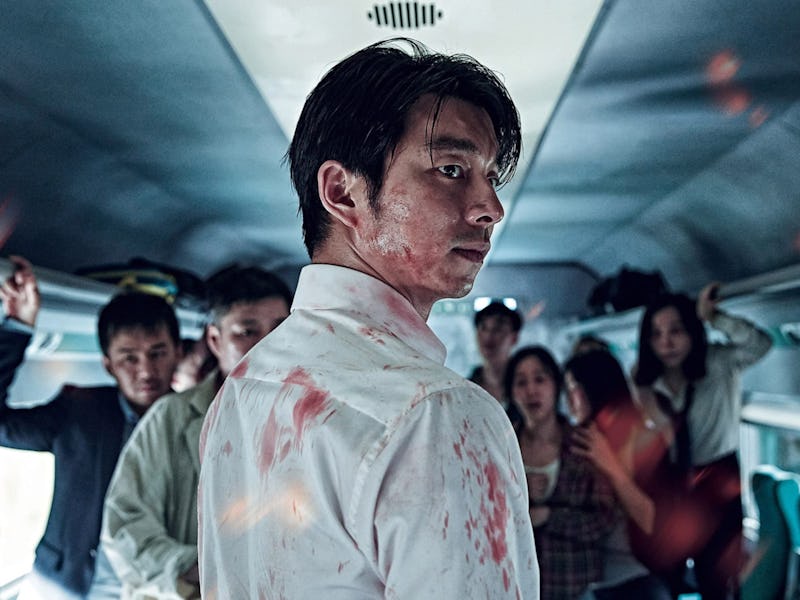You need to watch the most stunning sci-fi action thriller on Amazon Prime ASAP
This 2016 action-packed movie is a definitive work in the zombie genre.

Zombies can never rid themselves of their scare factor. Films dedicated to their re-animated lives date back to the 1930s with White Zombie. What makes these stories frightening isn’t the brains and gore, but the sobering realization that the world they now stumble through is dangerous and morose. Society is not just being haunted by otherworldly monsters, but by the decaying faces they once knew.
The best of the zombie genre spins thoughtful allegories or introduces a new twist into a familiar setting. The most iconic movie about the undead, George A. Romero’s Night of the Living Dead, is a dreary and pointed look at who the monsters in America are. And they aren’t necessarily the living dead, but those of whom create the divides in the country which allow such evil to fester.
Then, there is Danny Boyle’s 28 Days Later, which introduced the idea of a “quick zombie” while Shaun of the Dead from Edgar Wright played with the notion that we’ve all become zombified due to our reliance on routine and conformity. Anna and the Apocalypse refreshed the genre with festivity and music. As with many genre films, their overall packaging often contains something more provocative, and their horrors make for lasting impressions.
Yeon Sang-ho’s 2016 film Train to Busan is a perfect combination of dark wit, thrilling action sequences, and a broken heart at its center that makes it one of the finest films of the last decade. Here’s why you need to watch Train to Busan, now that it’s streaming on Amazon Prime Video.
When a chemical leak at a biotech plant occurs, it births a zombie apocalypse that begins to ravage South Korea. Set on a speeding train, Seo Seok-woo (Gong Yoo) and his estranged daughter Seo Soo-an (Kim Su-an), along with other passengers, must try and survive a sudden, violent outbreak until they make it to Busan, which has been declared a safe zone.
The zombies here have crucial disadvantages as they only attack when they can hear or see the passengers and can’t operate the train doors. With character designs that evoke erratic movements as if marionette strings are controlling them, the zombies move only in a feral, forward-moving motion, recalling Yeon's enthralling CGI creations in the animated films The Fake and The King of Pigs.
Gong Yoo and Ma Dong-seok in Train to Busan.
Train to Busan gives its entire cast of characters moments to shine. The differing perspectives between Gong’s Seo Seok-woo and Yoon Sang-hwa, played by Ma Dong-seok, offer great conflicting narratives, even though it’s undeniably Yoo’s film. Seo Seok-woo isn’t an attentive father, as we learn at the start, but by taking this trip with his daughter, he’s taking a step towards making amends. The film never tries to make excuses for him. Instead, he and his daughter are kept mainly alive with the help of others and thanks to Yoon Sang-hwa’s reliable nature.
Through these two characters, we see the survival instincts of the working class pitted against the rich. The movie even showcases the differences in how each actor embodies their roles. While Gong is cast to be suave and lean with a boyish face splattered with blood, Ma Dong-seok, in comparison, barrels through the train as if a natural-born brawler.
The film never vilifies either character but rather places blame on the corporations that caused the apocalypse. While classism is a critical point in the movie and the class divides between them are made clear, it’s the unity of the survivors that evokes the greatest of emotions. Through showing the loss of humanity, the film and its script still manage to deliver the rallying spirits of human beings in their attempts to save and protect one another.
Train to Busan doesn’t take its characters for granted.
What immediately makes Train to Busan one of the best of its genre is how it understands the impact of the story’s casualties. The body count isn’t simply there to drum up the drama or to force the stakes to become impossible. The emotional toll is immense as parents, partners, the elderly and the young are all unable to be spared in the rampage.
From a homeless man who snuck onto the train and a baseball team to a working-class man and his pregnant wife, the story gives us just enough of their traits - from their heroism to their selfishness - that when someone is murdered (often in grizzly, brutal ways), we feel that loss. By knowing so many of the victims, the film refuses to allow us to separate them from their humanity. The chase is scary, the loss of their minds to animalistic instincts is depressing - and that’s the key to making a zombie film so thoroughly haunting. It’s not the loss of life but the loss of self.
In a pivotal moment, Soo-an weeps while singing the song “Aloha ‘Oe,” embodying the contradicting sounds of sweetness with lyrics bearing farewell. Zombie films so often present dissenting moods of perseverance and loss and what it means to find oneself on the other side of it all. The punch is that there is a refuge to be had and the characters learn of it early as they race against the odds to make it to Busan. This makes the countless casualties all the more striking and grim. When hope exists at the end of the world but you’re entering it all alone, grief drowns out any sense of relief.
Train to Busan is now streaming on Amazon Prime Video.